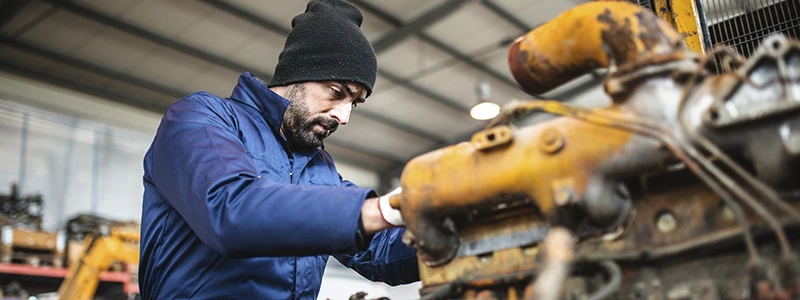How to become an Engine Reconditioner

Engine reconditioners set up and operate machinery to restore and recondition the machined surfaces of engines and related vehicle components.
Personal requirements for an Engine Reconditioner
- Enjoy practical and manual activities
- Mechanical aptitude
- Good eyesight (may be corrected) for precision work
- Able to keep up to date with technological change
Education & Training for an Engine Reconditioner
To become an engine reconditioner you have to complete an apprenticeship. Entry requirements may vary, but employers generally require Year 10.
Duties & Tasks of an Engine Reconditioner
Engine reconditioners:
- Dismantle, check and inspect engines for wear
- Re-grind camshafts and crankshafts
- Repair and recondition cylinder heads and cylinder blocks
- Check various components using micrometers and dial indicators
- Diagnose reasons for engine failure
- Pressure-test cylinder blocks and cylinder heads
- Install engines in cars, boats, trucks or tractors
- Assemble engines after repair
- Balance tailshafts, crankshafts and flywheels.
Tasks
- Forming metal stock and castings to fine tolerances using machining tools to press, cut, grind, plane, bore and drill metal
- Setting guides, stops and other controls on machining tools, setting up prescribed cutting and shaping tools and dies in machines and presses, and setting controls for textile machines
- Fitting fabricated metal parts into products and assembling metal parts and subassemblies to produce machines and equipment
- Preparing pattern mechanisms to control the operation of textile machines used to spin, weave, knit, sew and tuft fabric
- May erect machines and equipment on-site
- Checking fabricated and assembled metal parts for accuracy, clearance and fit using precision measuring instruments
- Studying drawings and specifications to determine suitable material, method and sequence of operations, and machine settings
- Diagnosing faults and performing operational maintenance of machines, and overhauling and repairing mechanical parts and fluid power equipment
- Cutting, threading, bending and installing hydraulic and pneumatic pipes and lines
Working conditions for an Engine Reconditioner
Engine reconditioners work in specialised workshops, sometimes concentrating on one aspect of the job.
Employment Opportunities for an Engine Reconditioner
Engine reconditioners work in automotive engine re-manufacturing companies. They may undertake post-apprenticeship courses in the motor mechanic, automotive, electrical, fitting and turning, and engine management fields. This can lead to specialisations in performance development or specialist modification work. Qualified tradespeople with advanced academic knowledge in production engineering may take up positions as technical officers or technicians and work with design engineers.Some engine reconditioners complete courses in business management and become owners of their own businesses. Other career options include positions in industry for teachers and trainers, technical sales representatives or field representatives.

Average age
36

Future Growth
N/A

Gender Share
2% female

Average full-time
43 hours

Weekly Pay
N/A

Skill level rating
Medium skill

Unemployment
Lower unemployment

Full-Time Share
85%

Employment Size
79,300

Employment by state
ACT: 0.2%
NSW: 24.8%
NT: 1.3%
QLD: 27.6%
SA: 6.4%
TAS: 2.1%
VIC: 16.3%
WA: 21.3%
Age brackets
15-19: 3.3%
20-24: 10.1%
25-34: 25.3%
35-44: 22.2%
45-54: 21.9%
55-59: 9.1%
60-64: 5.5%
65 and Over: 2.6%
Education level
Advanced Diploma/Diploma: 5.2%
Bachelor degree: 1.9%
Below Year 10: 1.1%
Certificate III/IV: 80.4%
Post Graduate/Graduate Diploma or Graduate Certificate: 0.4%
Year 10 and below: 4.6%
Year 11: 2%
Year 12: 5.7%
Years 11 & 10: 6.3%

